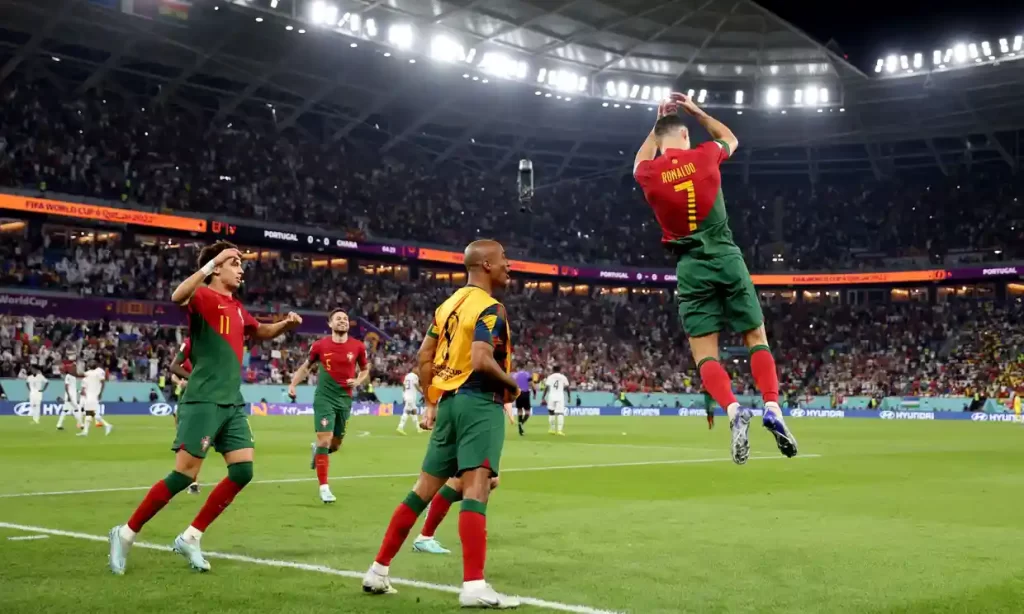A laboured contest morphed into a thriller and, cutting through it all, Cristiano Ronaldo managed to own the story. That was hardly a surprise in the circumstances and it was certainly what the crowd, many dressed in Portugal shirts but a vast swathe clearly present to see one man only, demanded.
Their loyalty was rewarded by an emphatically converted penalty that brought a moment in history. Ronaldo became the first male player to score at five different World Cups and, whether you loathe the circus or adore the fanatical drive and egoism that make him such excruciatingly hard work at 37, it is an achievement nobody can brush off.
This was not vintage Ronaldo: it was a slower and more frustrated tribute act, albeit one that carried Portugal’s only goalscoring threat for three-quarters of the game. At his peak he would have dismissed Ghana with a hat-trick but instead he spent the dying moments watching in horror from the bench as, having snuck behind the dozing goalkeeper Diogo Costa to steal the ball, Iñaki Williams stumbled when a sensational equaliser beckoned.
Ronaldo was among those to console Costa, clearly shaken by his error, at full time. It was all in a night’s work for a player who is freshly unemployed.
“It was a week that finished this chapter,” Ronaldo said of the storm surrounding his departure from Manchester United that engulfed the buildup.
“It is closed and now I want to start with the good foot. We started, we won, I want to help my team.” That is ultimately what he did although the headlines would have looked different had two glaring misses within the first 13 minutes, a free header that he planted wide from four yards particularly astounding, proved decisive. A goal after the half-hour was correctly disallowed for a push, much to the dismay of his public, and until benefiting from a marginal decision both he and Portugal had been off the pace.
Ronaldo just beat the otherwise excellent Mohammed Salisu to the ball in the 65th minute but the contest was only close because, as on several prior occasions, he had not been quick to it. His touch was followed by a snick from Salisu, who was deemed by the referee Ismail Elfath to have caught Ronaldo on the follow through. VAR opted not to intervene and, in fairness, there was no clear and obvious error even though the award was soft.
“This was a beautiful moment,” he said. “It was an important win, we know the first match in these competitions is crucial, but also the world record makes me very proud.” Those attending were treated, amid raucous delight, to his trademark celebration but it quickly risked being an exercise in hubris.
Ghana had set out cautiously, spending most of the first half playing a flat back five, but grew in confidence and had been the better side since the restart. They channelled that self-assuredness into an equaliser, the lively Mohammed Kudus centring through Danilo Pereira’s legs from the left for André Ayew to tap in.
Otto Addo’s players had, however, been erratic in possession and they were punished twice by the kinds of counterattack Portugal had struggled to stitch together.
The deciding goals came within seven minutes of Ayew’s leveller and were both created by Bruno Fernandes, who thrived as the game became stretched. João Félix clipped the first in adroitly after Rahman Baba had been unable to cut out Fernandes’s pass: he has struggled for Atlético Madrid but it was a timely reminder Ronaldo may have an heir apparent.
Ronaldo was withdrawn to a predictable ovation, as well as equally foreseeable distaste on his part, and it seemed a victory lap could be prepared. But the Ghana substitute Osman Bukari postponed it with a well-taken header and, had Williams properly rewarded his own initiative deep into nine minutes of added time, the evening would have brought more than one exceptional achievement.
The match had become gripping from nowhere and Addo felt it had turned on the penalty incident, calling it “a special gift from the referee” and a “really wrong decision”. His opposite number, Fernando Santos, could bask in its consequences.
“Cristiano is a phenomenal legend like many others who have come and gone,” Santos said. “In 50 years’ time we will continue to talk about him.” At the current rate his ability to set the agenda will endure through the decades.
Source: The Guardian


